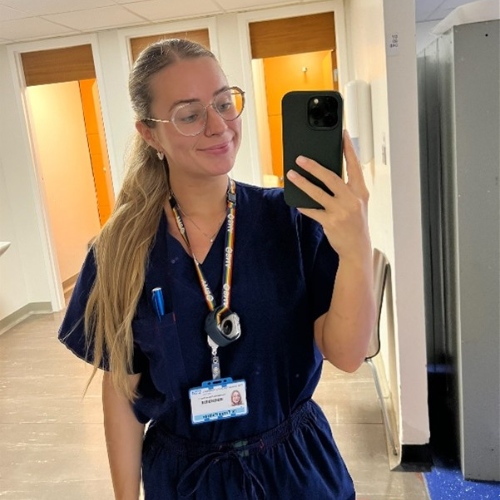13 January 2025 |
3 minutes
How to be a healthy medical student

As a medical student, you know all there is to know about health…right? Body mass index, a balanced diet and cures for diseases. So, why is it that nearly all medical students neglect the advice they give to patients and end up sleep deprived, ill and burnt out?
To help you kickstart 2025 in the right way, we sat down with F1 Resident Doctor, Freya Palmer, to ask why medical students forget to look after themselves. She also shares her top tips for staying healthy.
Why are medical students good at ignoring what they know best – how to look after the body and mind? The long and short of it is that we have deadlines, a level of perfectionism that leads us to study late at night, and a belief that we are young and invincible.
However, we’re not invincible, and the career we have signed up for is highly stressful and hugely demanding of our time. To look after our patients, we have to look after ourselves first.
I am an FY1 doctor in the NHS and I’ve been interested in mental wellbeing and healthy living for as long as I can remember. Throughout my six years at medical school, I developed healthy habits that I believe have helped me succeed.
I can categorically say that I have graduated as a much healthier person than I was when I started studying. By that I don’t mean I drink kale juice every morning before a 5am workout. I mean that I take a healthy approach to living life. So, here are my tips, split into mind, body and soul.
Mind
- Don’t study within the two hours before you intend to go to sleep
- Avoid blue light in the hours preceding sleep
- Establish a regular sleeping pattern, aiming for 7-9 hours a night
- Get organised
- Spend time with non-medics!
- Check in with yourself
- Start revision early
You wouldn’t expect your car to cool down immediately after a 200-mile drive, would you? This is probably my single best sleep-related tip.
Put a red-light filter on your phone and laptop after 7-8pm, as blue light suppresses melatonin production.
Experts say your wake-up and bedtime should be within the same 1-2 hours every day as a way to regulate melatonin production.
At the start of each year, make a list of your deadlines using your assessment guides, then set yourself a deadline of having the piece of work completed a week or more in advance. Life can get in the way, and this method can help accommodate this. I also love planning each week using a weekly planner.
Living with medics can force your brain to stay in medicine mode, and you shouldn’t be in medicine mode all of the time.
Ask yourself how you are feeling – what needs aren’t being met right now? If you struggle with poor mental health, please reach out to the support services at your university and your personal tutor. They can’t help you if they aren’t aware of what you’re going through.
Starting revision early can help you avoid stress, feel more prepared and identify the weaker areas that will ultimately improve your grade. There is a wealth of revision technique advice available online (for example, the Pomodoro method), but generally speaking, note-taking doesn’t really help you learn. Exam question banks are much more effective.
Body
- Prepare meals at home
- Pack snacks or protein bars for placement
- Introduce new exercise habits slowly
- Combine socialising with physical activity
- Listen to your body
Hospital food is overpriced and not always available. You’ll save money and have more fuel to learn.
They always come in handy.
If you want to start being more active, fantastic! Just don’t try to jump into the gym four times a week straight off the bat. This isn’t sustainable and will likely leave you feeling tired. Start small, go once a week for two weeks, and then gradually increase the frequency.
It’s a great way to look after your mind and body at the same time. You could swap out that evening drink at the bar for a weekend walk with a coffee.
If you are fighting off a cold and are absolutely exhausted, take the day off placement, rest, recharge, and you’ll recover from illness quicker.
Soul
- Set boundaries with yourself when studying
- Make an effort to see some daylight
- Maintain your hobbies
- Learn to say no
For example, I never study after 9pm. It only ruins my sleep! Another habit I created was studying hard throughout the week and having weekends away from medicine completely. This gives my brain the reset and mental rest it needs. This may not be possible in exam season, but remember that it’s a marathon and not a sprint.
This helps your circadian rhythm and mental health. Plus, it’s good for your eyes to get away from hospital screens and lights.
Every older doctor will tell you this – medicine is not everything there is to life. At the end of the day, it’s just a job.
There will be lots of social events you feel pressured to go to, but your time is scarce – use it only how you want to.
Good luck with medical school – but please don’t sacrifice your health for it!

By Freya Palmer
F1 Resident Doctor
